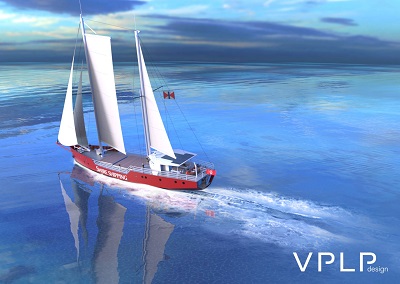Related News

The University of the South Pacific (USP) in a partnership with Swire Shipping plans to support the Micronesian Centre for Sustainable Transport’s (MCST) to build the Pacific’s first low-carbon, low-cost sail-assisted inter-island cargo vessel to serve communities in the region that lack cargo handling infrastructure.
With up to US$4 million (FJD 8 million)in total funding allocated by Swire Shipping for the project, USP will support MCST’s research efforts addressing challenges associated with constructing and operating a wind-motor hybrid vessel on underserved routes. This effort will be administered by USP under Project Cerulean.
Tenders for the vessel construction are now being considered, and the prospect of building the 41-meter sailing vessel in Fiji is being evaluated.
Project Cerulean involves extensive investigation of trade flows domestically and internationally, shipbuilding capacity and supply chains in the region, cost-effectiveness of low-carbon technologies, and a range of policy and regulatory issues relevant to international operations in the shipping sector.
The project hopes to deliver a case for low-carbon cargo operations which proves commercially viable and replicable throughout the Pacific.
Project Cerulean has been scheduled in two phases. Phase one entailed evaluation of existing transport needs, market research, and preliminary design of a vessel to meet demands of outer island communities currently underserved by existing transport services.
Project Cerulean is currently in stage one of phase two which involves final design and construction.
Project Officer for Project Cerulean, Andrew Irvin, said, “We concluded phase one at the end of 2020, which involved work with the design review team, cargo and route evaluation, and development of a business case and operational plan for the prospective vessel”
Mr Irvin added that the initial operational trial will hopefully provide both direct commercial service improvements to the liner route upon which voyages are undertaken.
“Our broader benefit will be the range of data collected on the socio-economic impact of the vessel and how it may be replicated with subsequent ships if the savings accrued end up proving sufficient to merit deployment of additional vessels,” he said.
“The research findings should also be useful for the countries involved to better understand the needs of communities impacted by the operational trial, and aid in future development planning.
USP’s Acting Vice-Chancellor and President, Dr Giulio Masasso Tu’ikolongahau Pāunga said “This collaboration will assist our region with sustainable transport solutions and USP is glad to be working with Swire Shipping to respond to the needs of the Pacific region.”
James Woodrow, Managing Director, The China Navigation Company, the parent company of Swire Shipping said, “With many communities at risk of disappearing we must take action to drive change. We are committed to reducing our greenhouse gas (GHG) emissions footprint, ultimately to net-zero by, and preferably well before, 2050.”
Swire Shipping has one of the longest-running operations in the Pacific Island Countries, and is aware of the challenges faced by Island communities, exacerbated by the impacts of climate change. As such, it is keen to play a role in supporting the communities there.
You can learn more about Swire Shipping and its commitment to the Pacific region here: https://www.swirecnco.com/media-room/press-releases/2021/swire-shipping-serving-the-communities-in-which-we